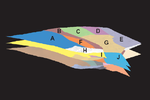Difference between revisions of "CBM"
| Line 21: | Line 21: | ||
*[http://www.scec.org/research/focusgroups/structural/2004report.html SCEC USR Annual Report] | *[http://www.scec.org/research/focusgroups/structural/2004report.html SCEC USR Annual Report] | ||
*[http://structure.harvard.edu/~andreas/cbm/cbm_mojave.html Andreas Plesch Mohave Block Development Site] | *[http://structure.harvard.edu/~andreas/cbm/cbm_mojave.html Andreas Plesch Mohave Block Development Site] | ||
| + | *[http://structure.harvard.edu/cfm/additionalproducts.html Harvard USR Products] | ||
*[http://structure.harvard.edu/cfm/ Harvard CFM Site] | *[http://structure.harvard.edu/cfm/ Harvard CFM Site] | ||
Revision as of 00:17, 12 February 2012
Community Block Model (CBM) is a 3d representation of southern California. Blocks in the block model, represent coherent regions with similar material properties. Edges of blocks are often along fault boundaries, showing significant material contrasts across faults.
Contents
Block Model Information
Animation (*.mov format) showing elements of the Community Block Model, prepared by SCEC Interns.
- Block Model Animation (33Mb .mov file)
Overview of Community Block Model (powerpoint file format) describing elements in model and showing images of several of blocks.
- Block Model Overview presentation (25Mb *.ppt file)
Scientific paper describing development of the Block Model
- Block Model Paper (663K pdf format)
VTK Block Representation
The Block Model is distributed in several 3D file formats including .txt format, ts format, and vtk format. To view the Block Model using 3D software, we recommend use of the open source 3D viz software Paraview. Paraview can read in the Block Model as defined in these vtk files.
- CBM Block Model in VTK format (4.7Mb tar format)
SCEC Block Model Web Sites
- SCEC USR Annual Report
- Andreas Plesch Mohave Block Development Site
- Harvard USR Products
- Harvard CFM Site

